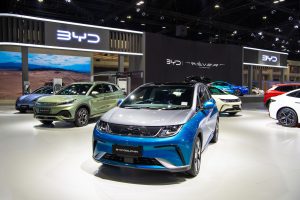Chinese automaker BYD yesterday opened an electric vehicle plant in Thailand, its first factory in Southeast Asia, marking the latest move by Chinese automakers to expand their footprint in the fast-growing regional EV market.
The $486 million factory in Rayong, south of Bangkok, will employ around 10,000 workers and have an annual production capacity of 150,000 vehicles per year, the Associated Press reported. During the opening ceremony, Wang Chuanfu, the CEO and president of BYD, presented a BYD Dolphin to a charitable foundation linked to the Thai royal family.
“Thailand has a clear EV vision and is entering a new era of auto manufacturing,” Wang said during the ceremony. “We will bring technology from China to Thailand.” To mark the occasion, BYD has also offered customers hefty discounts on its Dolphin and Atto 3 SUV models.
The factory reflects BYD’s focus on Southeast Asia, a region where EV sales more than doubled in the first quarter of 2024 from a year before, according to figures from Counterpoint Research. Of these, BYD was by far the leading EV brand, accounting for 47 percent of sales during this period, followed by Vietnam’s VinFast.
The BYD plant, which broke ground in March of last year, is part of a wave of investment from Chinese EV makers in Thailand, which Reuters puts at more than $1.44 billion. Among the other Chinese companies setting up factories in the country are Hozon New Energy Automobile, Changan Automobile, Great Wall Motor, and SAIC Motor, among others.
Much of this has stemmed from the generous subsidies and tax incentives that the government has offered to EV makers, in the hope of building on the country’s long-time status as the region’s leading auto producer. The government aims to convert about 30 percent of its annual production of 2.5 million vehicles into EVs by 2030.
So far, most of these incentivized have been taken up by Chinese firms, who have now established a considerable lead over the Japanese firms that have traditionally dominated Thailand’s auto manufacturing sector. According to Counterpoint Research, three-quarters of EV sales in Q1 were made by Chinese firms, while sales of internal combustion engine cars, a market traditionally dominated by Japanese and Korean firms, declined by 7 percent.
BYD, which is currently vying with Tesla for the status of the world’s largest EV manufacturer, was an early market entrant in Southeast Asia and has gained market share on the back of a canny strategy of working with dominant local firms. As Reuters reported last September, the firm’s success “is based on a pattern of distribution partnerships with large, local conglomerates that have allowed the carmaker to expand reach, test consumer preferences, and navigate complex government regulations in the region.”
Even as BYD and its Chinese counterparts pull ahead, the competition between EV manufacturers is heating up, as is the competition between Southeast Asian nations to attract foreign investment in EV and EV-adjacent industries. The opening of the BYD plant came a day after Indonesian President Joko “Jokowi” Widodo presided over the opening of the country’s first electric battery plant.
The $1.1 billion factory in Karawang, West Java province, was developed as a joint venture between South Korean battery producer LG Energy Solution (LGES) and carmaker Hyundai, which will also operate the facility. The plant has the capacity to produce 10 gigawatt-hours of battery cells each year, enough to power 150,000 electric cars. The batteries will be shipped to Hyundai’s manufacturing plant in nearby Bekasi to power various Hyundai and Kia vehicles, including Hyundai’s Kona Electric, which the firm plans to launch in Indonesia later this month, the Korea JoongAng Daily reported.
The factory marks an important milestone in the country’s efforts to build a complete EV manufacturing ecosystem around its rich deposits of nickel and other crucial minerals. “This is the first and largest EV battery cell plant in Southeast Asia, and I am sure we will be able to win this competition with other countries because the nickel, bauxite, and copper are here,” Jokowi said at the launch ceremony.

































